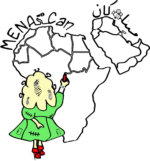The Impact Hub: Where Inspiring Stories Thrive


MENA-can Hosts Yemeni Journalist
Journalism Under Fire: Yemen's brave journalists and the importance of solidarity


Kid Change-Makers in Bangladesh
Empowering Kid Change-Makers in Bangladesh’s Most Marginalized Communities
Journalism Under Fire: Yemen’s brave journalists and the importance of solidarity
Wael, is a Yemeni journalist and founder of a small not-for-profit online health platform. His dream was simple: to help people in Yemen learn more about their health — not just physical health, but mental and reproductive health too. In a country where access to health information is limited, especially for women and rural communities, this was no easy task. But Wael never gave up.
His dedication, however, came at a heavy price. In Yemen, speaking the truth and defending people’s rights can put your life in danger. It didn’t take long before the authorities saw Wael’s reporting as a threat. They harassed him, invented charges, and threw him in prison. He was only freed after paying a huge fine — but the damage was done.
Wael recalls those times: “It is already extremely challenging to report and make a living as a journalist in Yemen. Everything is a struggle. The constant fear adds even more stress. I could not bear this fearing atmosphere any longer. After my release, I was utterly broken and hopeless. I wanted to run away and leave the country. But as a Yemeni, the doors are closed to us and obtaining a visa is difficult. So I reached out to my friend who leads the organisation MENA-can which have a program to support and host human rights defenders. After a few weeks, I was able to travel to Tunisia. I could finally rest and establish new friendships.
It was a transformative experience to be in Tunisia, a much more liberal country. They are very advanced in term of women’s rights and political transition compared to our situation. In Yemen, it is difficult to connect with the outside world and peers. The situation is incredibly dire, and we often feel overwhelmed. I wish Yemeni journalists could have the same opportunity.”
As part of our commitment to supporting changemakers across the region, we understand well the risks they face every day. Many who stand up peacefully for freedom, justice, and dignity find themselves targeted — harassed, threatened, slandered, or worse.
At MENA-can, we stand firmly in solidarity with these courageous human rights defenders. That is why we created Baytoona: our solidarity residency program that offers changemakers like Wael a safe haven to rest, recharge, connect, and build strength for what comes next.
For Wael, Baytoona provided a lifeline, providing him a safe and inspiring space where he could re-energize, receive tailored support, and engage with like-minded allies to reinforce his local actions for change. He stayed few weeks before to leave back stronger to Yemen.
This is what MENA-can does best: we are an enabling hub for social entrepreneurship and grassroots action.
We build people’s capacities, open doors for knowledge exchange, and foster connections that help ideas grow and communities thrive. Because we believe that real change happens when we trust and empower people to dream and to do — even in the hardest places.
Tunis, July 2023.
Women Using Tech to Broaden Horizons and Opportunities
Sonia, like too many young graduates in Tunisia and across the MENA region, found herself unemployed despite all her efforts and education. With each job rejection, her hope dimmed a little more, and she started to believe that leaving her country might be her only option for a better future.
But deep down, Sonia wasn’t ready to give up. Determined to find another way, she reached out to MENA-can for support. At first, she was shy and unsure of her own potential. But through one-on-one coaching in personal development and design thinking, something inside her reignited: her confidence grew, her ideas found direction, and she began to see her own resources in a completely new light.
She realized that technology could be more than a distraction — it could be her gateway to personal growth and professional independence. With MENA-can’s help, Sonia dove into tech literacy and entrepreneurship training designed specifically for women. For the first time, she learned how to do digital research, market her ideas online, and use tech to create positive change in her community.
Empowered by this new horizon, Sonia launched her first online venture on social media — selling natural products made by women in her community. What began as a small experiment quickly became a source of income and opened doors she had never dared to dream about.
Her story didn’t stop there. Seeing her success, other women around her felt inspired to follow her lead. Sonia didn’t hesitate — she formed a local support network to help other women set up their own online businesses. One by one, women in her town began using digital tools to promote and sell their handmade textiles, traditional crafts, and delicious local food.
Together, these women didn’t just earn income — they breathed new life into local traditions, boosted the local economy, and showed that when technology is put in the hands of women, it can bridge generations and create new opportunities.
Sonia’s journey is proof that when technology, mentorship, and courage meet, anything is possible.
At MENA-can, this is what we believe in and work for every day. Through tailored capacity-building, we help women like Sonia unlock their potential and turn their dreams into real businesses and impactful community projects. We guide them in leadership, project planning, advocacy, and connecting with others — giving them the tools they need to face challenges and lift others along the way.
Every woman like Sonia reminds us that change starts with one person daring to take a step — and a community ready to walk beside her.
Tunis, Janvier 2024.
Empowering Kid Change-Makers in Bangladesh’s Most Marginalized Communities
—In cooperation with the Mohamed Yunus foundation
Dhaka — Bangladesh’s bustling capital — is home to more than 24 million people. Beneath its vibrant culture and rapid growth lies a harsh reality: Dhaka hosts one of the world’s largest urban slum populations. In these overcrowded and under-resourced neighbourhoods, children grow up surrounded by extreme poverty, fragile infrastructure, and the growing threats of climate change.
Many of these children are born into hardship and struggle to make their voices heard in a world that often looks away. But at MENA-can, we believe these young voices hold the seeds of change.
A New Beginning: Empowering Young Voices
Partnering with a local school and trusted community leaders, MENA-can launched the Kid Journalist Change-Maker Club — a small but mighty experiment to empower children, ages 8 to 14, with the art of storytelling through photography. They were trained storytelling and provided with phone camera
Through this project, 20 bright young minds learned to see their surroundings through a new lens. They were asked to capture daily life — some photographed parents crafting handmade goods, mothers cooking in tight alleyways, neighbours running tiny street stalls, friends playing beside open drains — moments of struggle, resilience, and hope woven together by their own hands.
Storytelling Through Photography
Each photo was a window into their reality — raw, honest, and brimming with untold stories. What struck us most was not just what they chose to capture, but how boldly they spoke about it: what they loved, what they feared, and what they dreamed to change.
“It was incredible to see how quickly their shyness turned into curiosity and bold ideas,” said Saoussen, the project lead. “They weren’t just taking pictures — they were asking, ‘What can we fix? What can we build?’ By giving them this simple tool, we gave them permission to imagine a better future — and the confidence to say, ‘We can change it, too.'”
Fostering Resilience and Participation
This project was never just about teaching kids how to click a camera. It was about helping them find their voice and their power. It gave them courage to speak up, think critically, and lead small acts of change in their neighbourhoods. Parents, teachers, and community members began to see these children not just as passive victims of poverty, but as storytellers, bridge-builders, and future leaders in their own right.
Why This Matters
At MENA-can, we believe change-making is a mindset — it means seeing hope where others see despair, and solutions where others see only problems. These children embody that spirit. Against all odds, they turned daily struggles into stories that move people to care, listen, and act.
By equipping them with tools and guidance, we nurtured creativity, ownership, and community pride. The Kid Journalist Change-Maker Club is living proof that when young people are trusted and supported, they can inspire transformation far beyond their own streets.
Continuing the Journey
The success in Dhaka is only the beginning. We dream of seeing more Kid Change-Maker Clubs grow across the MENA region and beyond — so that children everywhere, no matter how invisible their struggle, can find their voice and shape their future.
At MENA-can, we know that when we amplify young voices, we plant the seeds for a more just, compassionate, and hopeful tomorrow.
Together, we can turn stories into action — and nurture the next generation of leaders our communities deserve.
Dhaka, June 2024.

